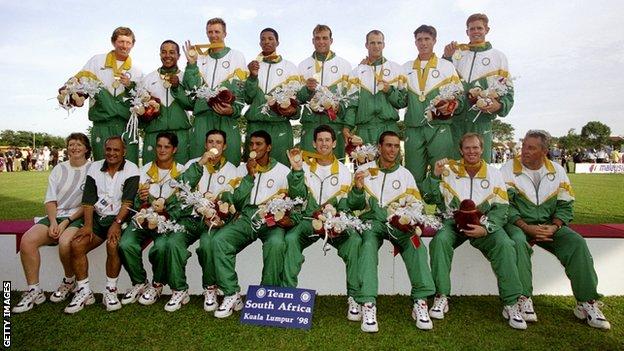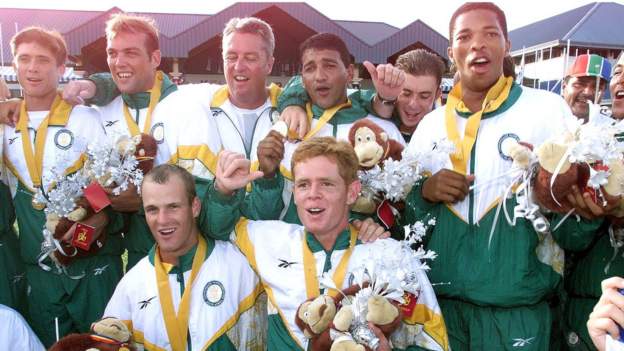Commonwealth Games: Stories from cricket’s last appearance at the Games
“A South African cyclist told me ‘you cricketers are just here to booze and party’,” Herschelle Gibbs said before breaking out into laughter. “He was right. But he didn’t have an answer at the closing ceremony when I showed him my gold medal!”
In Malaysia 24 years ago, 16 nations slugged it out on ropey pitches in Kuala Lumpur, battling stinking heat for matches during the day and, for some players, brushes with the organisers for their antics off the pitch at night.
“It’s not like in those days we were huge on fitness,” former South Africa batter Gibbs, who played 90 Tests and 248 one-day internationals between 1996 and 2010, told BBC Sport.
“The rest of the athletes taking part were in mint condition to perform at their very best. We had a team of young pups, and were all there to enjoy ourselves.”
While runners and swimmers were counting every calorie over their salads in the cafeteria at the athletes’ village, the cricketers were lapping up third helpings of ice cream to stay cool, and quenching a thirst with something stronger in the evening.
The tournament pitted some enthusiastic amateur cricketers against some of the world’s top players. Although not England. Unlike in 2022, England did not participate as it clashed with the climax of the County Championship.
The England and Wales Cricket Board (ECB) had mooted the possibility of sending a weakened team but the English Commonwealth Games authorities insisted on a full-strength side or nothing. England’s absence paved the way for Northern Ireland to make their one, and so far only, appearance at an international cricket tournament as a separate nation.
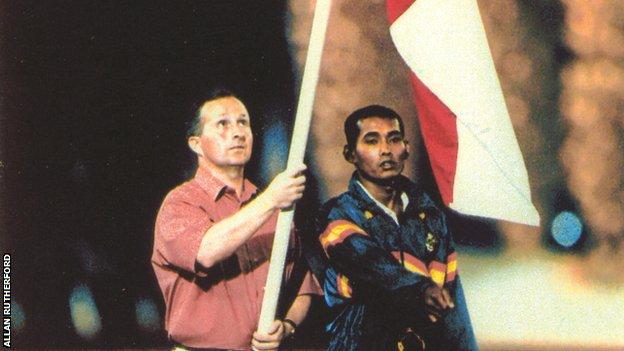
“We were able to ‘borrow’ the all-Ireland one-day ranking to qualify,” explained former skipper Allan Rutherford. “I even had the honour of carrying the Northern Irish flag at the opening ceremony. Viv Richards carried Antigua’s so I was in good company.”
A few of Northern Ireland’s players were professionals but many had day jobs. Dekker Curry worked in an abattoir, Derek Heasley was a fireman, while Kyle McCallan was fresh out of university and selling used cars. “I’d describe the Northern Ireland cricket team which took part as a cross between Cool Runnings and the Dirty Dozen,” joked ex-Northern Ireland seamer Paul McCrum.
Pitches from Mars, and netting in a car park
South Africa, captained by Shaun Pollock, were pitted against Northern Ireland in their opening group game at the Kelab Aman cricket ground.
Asked to bat first, Northern Ireland recovered from 33-4 to 89-5 before heavy rain lashed down. South Africa were set a Duckworth-Lewis target of 131 runs in 38 overs. Ryan Eagleson and Gordon Cooke shared the new ball.
“Gibbs edged one from me and departed for 11, Gordon bowled the other opener Mike Rindel, I got Derek Crookes caught behind then Andrew Hudson was run out,” Eagleson recalled. “At 23-4 we could scarcely believe it.” McCrum bagged the wicket of Jacques Kallis for 18 and at 57-5 South Africa were on the rack.
“Promoting cricket was the right thing for the Games but the pitches were maybe not up to the standard of players there,” McCrum acknowledged. “They were red coloured like the soil on Mars – in fact, the pitches on Mars probably played slightly better!”
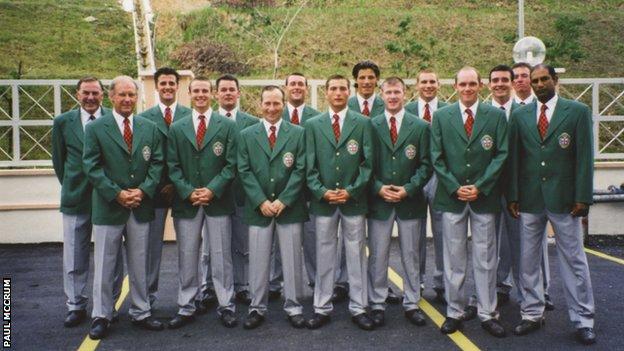
Dale Benkenstein and Pollock came together to perform a rescue act for the Proteas.
“We were in big trouble,” Benkenstein said. “The training facilities in Malaysia for cricket obviously weren’t great – I remember having extra practice in a hotel car park. Maybe a few of our guys were caught cold on difficult wickets.
“But that was where Bob Woolmer was really good. He was one of the best international coaches and he drummed into the lads ‘you just have get on with it. It doesn’t matter.’
“The situation we got ourselves in was pretty dire and people were saying ‘we don’t even know who these guys are’. Playing in England, I’ve developed a huge amount of respect for Irish cricket. But back in 1998, I’ll be honest, I wasn’t sure who most of them were.”
South Africa avoided an upset thanks to an unbeaten 44 from Benkenstein and 30 from Pollock, before more comfortable victories over Bangladesh and Barbados – the nations which make up the West Indies team took part separately – to set up a semi-final with Sri Lanka.
Waugh donned the face paint poolside
In one of the other groups, favourites Australia found life a little more easy going as they rolled Canada in their first match for 60.
One of the Canadian tailenders begged the Aussie quicks to go easy on him because he was back working in a pizza shop at home the following week. He was hit in the ribs, then lost his wicket soon after.
Play hard on and off the pitch was the Australian approach to the tournament. “We were at the bar every evening and generally the last to leave!” remembered spinner Brad Young.
“We were little bit more casual about the whole thing, as opposed to some of the athletes who had worked for four years. Although, there were high jinks from other teams. I remember some Canadian athletes got hold of this big slingshot and they were using it to pepper people with oranges and whatever else they could find.”
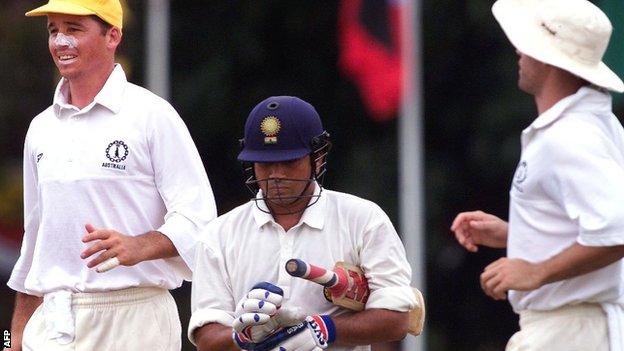
Australia skipper Steve Waugh, meanwhile, managed to bluff his way poolside to cheer on the country’s swimmers, painting his face in green and gold.
On the cricket field, Waugh’s men brushed aside an Antigua side featuring Richie Richardson and Curtly Ambrose before they faced India. The tournament clashed with the Friendship Cup – an ODI series between India and Pakistan in Toronto – so India controversially split their best players between the two events.
Waugh made a hundred in Australia’s 255-5 but Sachin Tendulkar (four) and VVS Laxman (11) both failed as India were dismissed for 109. Australia would meet New Zealand in the semis.
‘I got five wickets, then fainted on the boundary’
Scotland lost to New Zealand, Kenya in their group games and saw their match with Pakistan washed out – although they did get an early look at one of the world’s quickest ever bowlers.
“The Aussies told us Pakistan had this floppy-haired rapid bowler who had just broken through,” recalled ex-Scotland skipper George Salmond.
“The PA system wasn’t working and when we saw the opening bowling and thought ‘he’s not that quick’. The next over we saw this guy coming off a massive run-up and he sent one of the stumps flying back over the wicketkeeper’s head.
“I managed to keep out a few balls from Shoaib Akhtar then the heavens opened and the game was abandoned. I think to the relief of some players.”
Northern Ireland, meanwhile, were determined to finish the tournament on a high in their final game against a Bangladesh side who were on the brink of becoming a Test nation.
On a sweltering day at the Royal Selangor Club, McCallan’s 53 helped the Northern Irish post 177 before Eagleson and Cooke, their shirts drenched in sweat before taking the field, took the new ball.
“The hotel staff at the athletes’ village weren’t too happy with us because we kept cutting up the towels to make them into headbands which we dipped into the ice water to help keep us cool,” said Eagleson, who removed both Bangladesh openers.
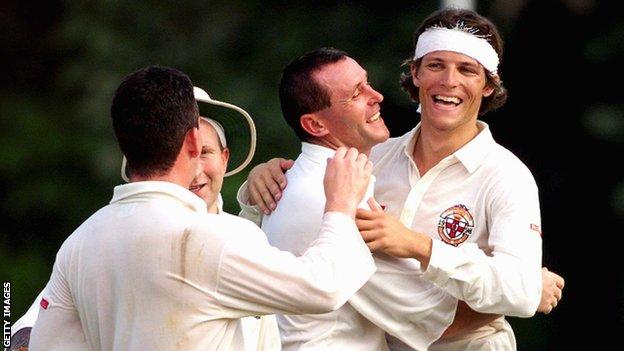
Cooke, however, bowled out of his skin to run through the Tigers’ middle order.
“It was seriously hot. Before going out to Malaysia we had to get on exercise bikes in steam rooms to help prepare for the heat but I still struggled,” he recalled. “I bowled the best 10 overs of my career, got five wickets, then fainted on the boundary. I sat there with my head in a bucket of ice water to recover.”
Bangladesh were dismissed for 63 to give Northern Ireland a thumping win.”We walked off to shake hands with the Bangladesh players and not all of them came out,” said Rutherford. “We were told some of the people back in Bangladesh would be burning effigies of them in the streets so perhaps their reaction was a little more understandable.”
South Africa’s golden dream
Australia strolled into the final. Spinner Young took the tournament’s only hat-trick as Stephen Fleming’s New Zealand were knocked over for a paltry 58 before Adam Gilchrist’s unbeaten 42 got them home one down in 10.5 overs.
“We seemed to steamroller sides all the way through,” Young said. “Myself and fellow spinner Gavin Robertson had a lot of success. If any bowler could roll up those wickets and take them round the world they would have because batting wasn’t easy.”
Benkenstein, though, bit his fingernails down to the quick as South Africa needed a nerve-shredding last-wicket stand of 35 between Alan Dawson and Nicky Boje to chase down 131 against Sri Lanka.
“When you win games like that – when the natural cause would be to have lost by 20 or 30 runs – you start thinking ‘geez this could be our tournament’,” he said.
Malaysia’s king, Yang di-Pertuan Agong Tuanku Ja’afar, was among the 7,532 spectators for the final at the Perbadanan Kemajuan Negeri Selangor Sports Complex.
South Africa’s players had held a lengthy team meeting before the final where Pollock and Woolmer had hatched a plan to upset the Aussies.
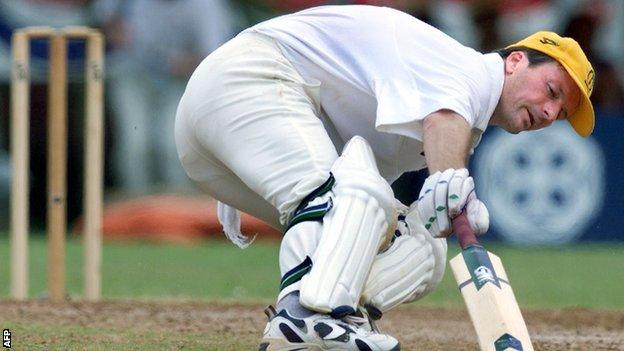
“Everything we discussed in the team meeting, the opposite happened,” Gibbs recalled.
Pollock and Woolmer planned to bat first, worried about Australia’s spinners in the second innings, but as the Proteas skipper walked out, he stood on the pitch and changed his mind. He backed up the decision with 4-19 of his own, taking the wickets of Mark Waugh, Adam Gilchrist, Ricky Ponting and Darren Lehmann.
“We’d been through all the Australian batters on what our plans were to them. ‘Gilchrist, don’t bowl short to him’ – he was out second or third ball caught with a short one that he pulled,” Benkenstein said.
“Michael Bevan, we discussed what a brilliant runner he was between the wickets, then Andrew Hudson ran him out. There’s a theme here isn’t there?! We said ‘don’t bowl on the legs to Mark Waugh’ and he was caught down the leg side.”
Captain Steve Waugh’s dogged unbeaten 90 helped Australia reach 183 all out, as a large troupe of Aussie athletes came down to the ground to support. Hudson and Rindel got South Africa off to a flying start..
Young said: “Rindel was a big left-handed guy who basically tried to smash everything. He was swinging and missing, nicking a few and hitting the odd one. He rode his luck. We just couldn’t get him out before the damage was done.”
Rindel made 67, Hudson got 36 before a diligent 44 from Kallis put South Africa on the brink of victory at 172-3. Lehmann bagged three quick wickets to cause a few butterflies before Mark Boucher and Benkenstein got South Africa home.
“I only got two runs in the final but they were the winning runs!” Benkenstein said. “Australia were absolutely devastated when they lost.”
‘Seeing Jonah Lomu eat lunch made it worthwhile!’
It is fair to say Australia coach Geoff Marsh and captain Steve Waugh did not take the defeat well. South Africa’s players had lapped up the bonhomie in the athletes’ village just as much as the Aussies, but the Proteas ended up with the gold medal.
At a dressing down the day after the final, Marsh and Waugh slammed a lack of professionalism and disrespect shown by Australia’s players.
“One of the few occasions we weren’t good enough in a big tournament, South Africa outplayed us in the gold medal game,” future captain Ricky Ponting said in a tweet shortly before this year’s Games, accompanied with a picture of his team tracksuit.
Although inevitably the march of time has softened the disappointment for others. Young, who would only play six ODIs for Australia, acknowledged it was a career highlight.
“I’m proud of that silver medal,” he said. “It’s only happened once and I was lucky that Shane Warne was injured because I’d have missed out if he was available. To get that opportunity was great, and a fantastic life experience.”
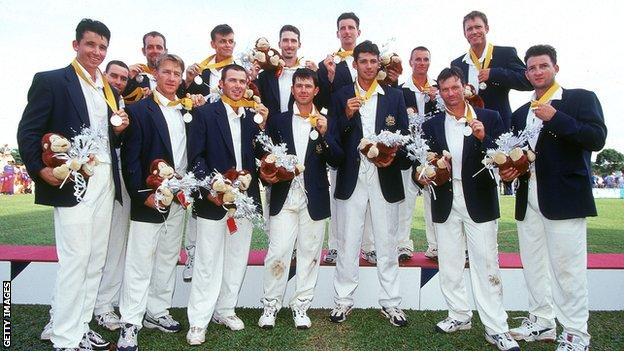
Later in 1998 a talented crop of South Africa players – boosted by the return of senior players including Hansie Cronje, who skipped the Games – would win the inaugural ICC Champions Trophy (then known as the ICC KnockOut) on home soil.
“It’s a collectors item, that gold medal, with cricket only appearing once at the Games, for the men at least,” Gibbs said. “It gave us confidence. The medal I really wanted was the Cricket World Cup the following year. Although my mind has gone blank about what happened in that tournament…
“We had an amazing time in the athletes’ village. It was worthwhile seeing how dedicated other athletes were, or in Jonah Lomu’s case witnessing in person just how much he could eat at lunchtime!”
For team-mate Benkenstein, it changed the course of his life: “It was one of the highlights of my career going to the Commonwealth Games. I met my wife Jacqui, who was a hockey player, during the event so I’ve got to say it’s a highlight of my career.
“The medal is tucked away safely in a box. Every now and then my children tend to get the box out and have a look at the things in there. A gold medal in the Commonwealths – not many people have done that, and even fewer cricketers.”
